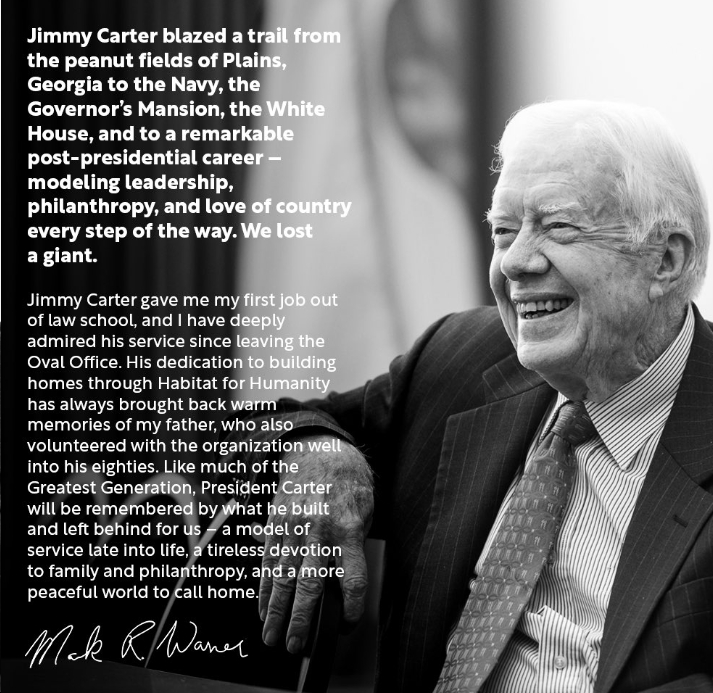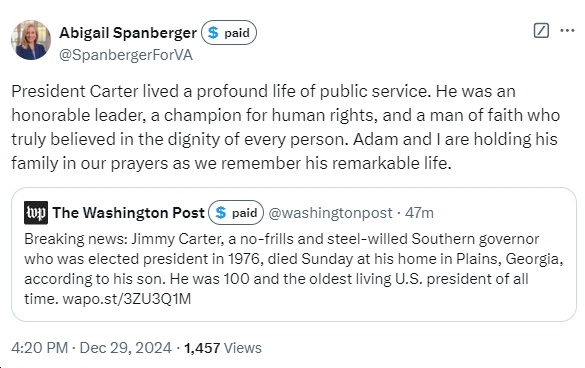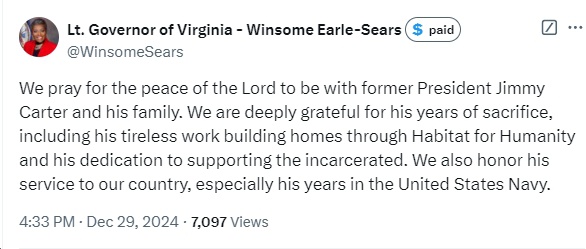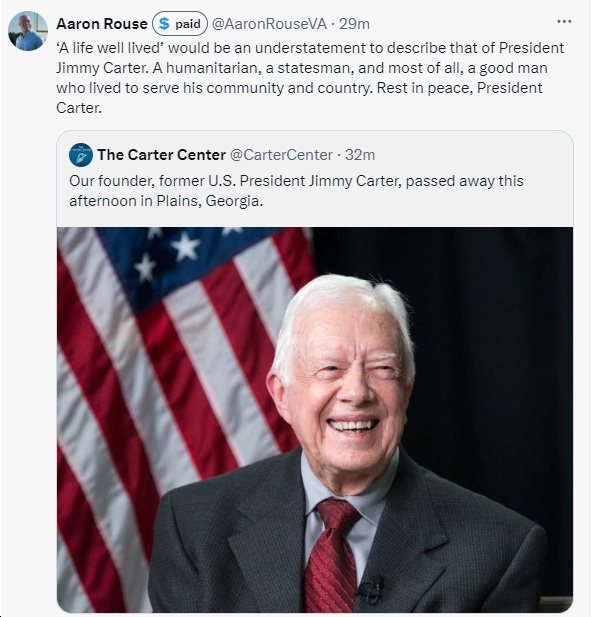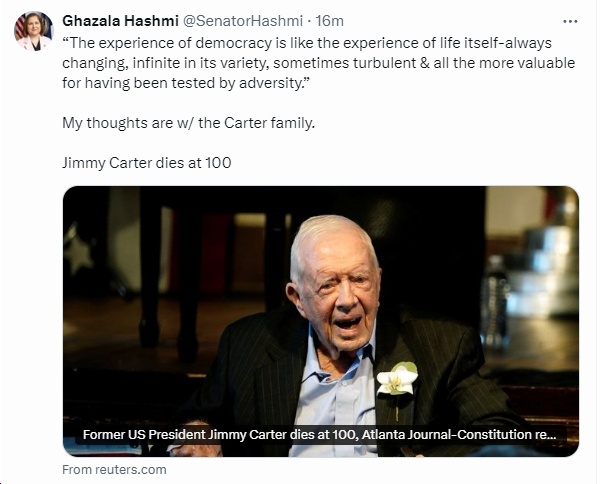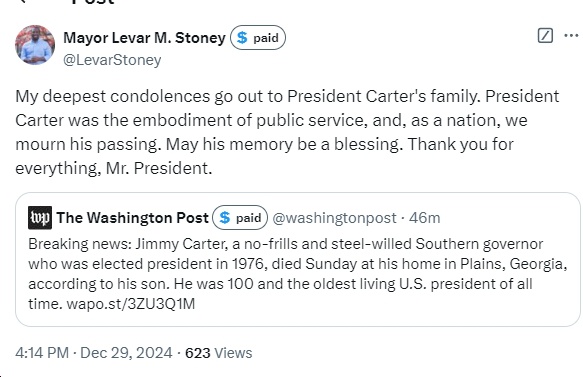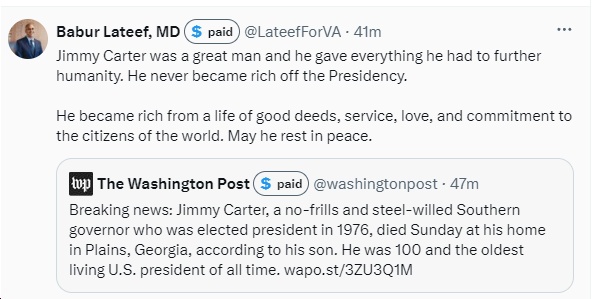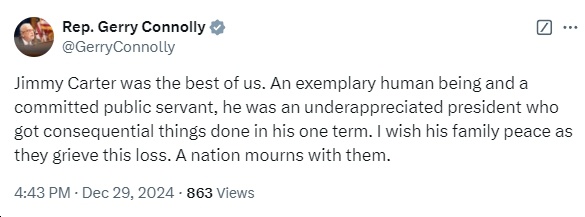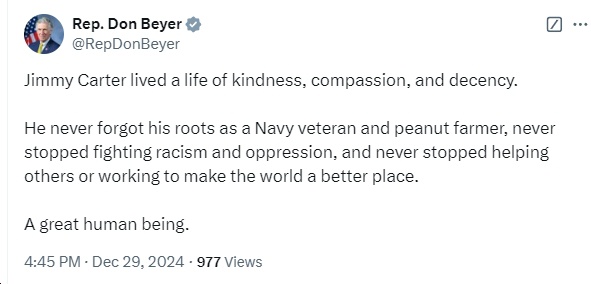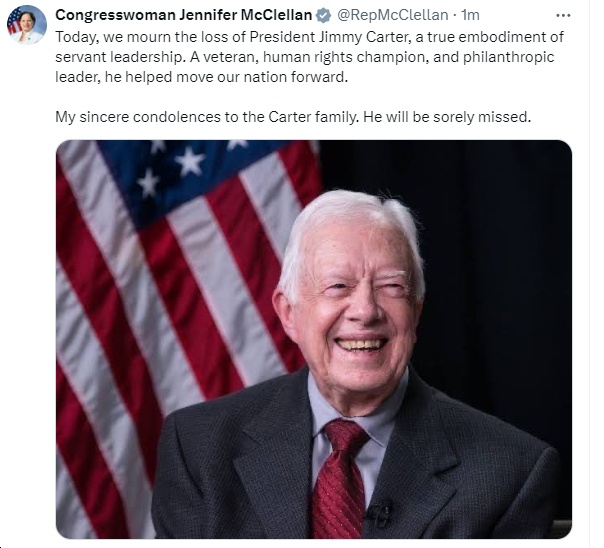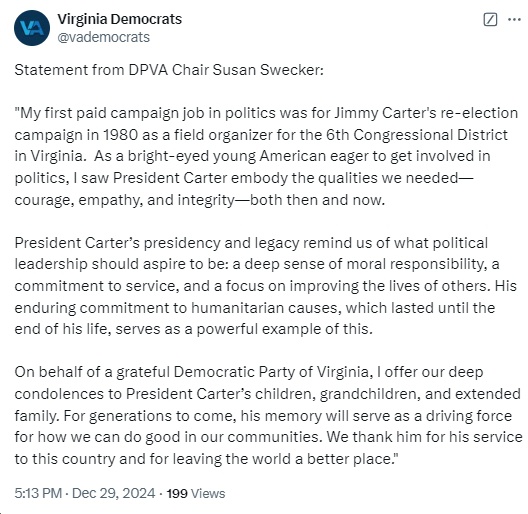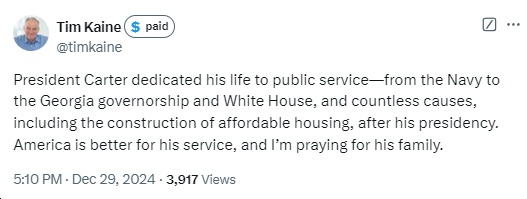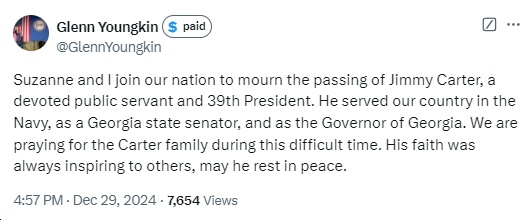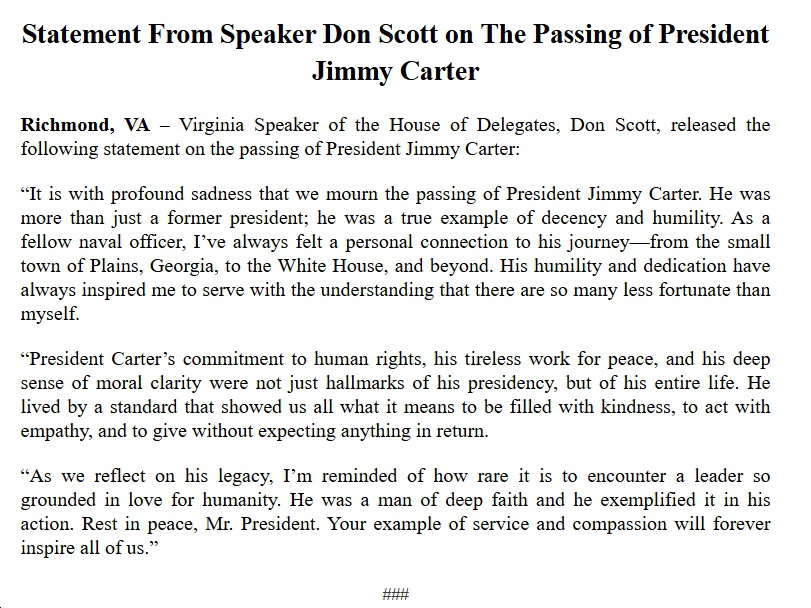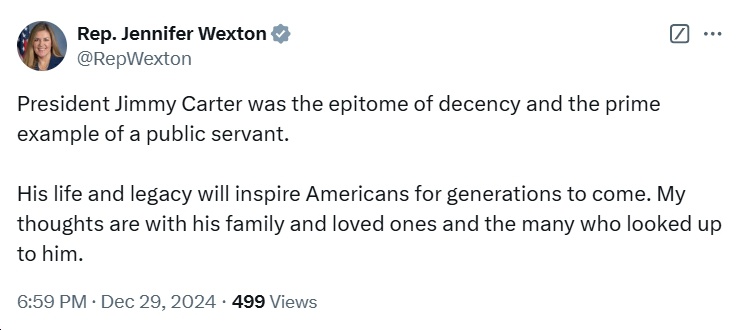Monday News: “MAGA Is Already Eating Its Own. Pass the Popcorn”; The U.S. Political Media Did a *Horrible* Job Covering Jimmy Carter’s Presidency, Just as It Did with Joe Biden’s; “Jimmy Carter, who died Sunday at 100, had deep ties to Virginia”
by Lowell
Here are a few international, national and Virginia news headlines, political and otherwise, for Monday, December 30.
- The Year in Climate: Record Heat, an Election, a Push for Justice and Reasons for Hope
- 2024’s most costly climate disasters killed 2,000 people and caused $229bn in damages, data shows
- Exclusive: The Russian billionaires whose chemical factories fuel Russia’s war machine
- Azerbaijan’s president says Russia must accept blame for plane crash (It’s definitely Russia’s fault. And no, Putin has NOT “apologized,” as the news media keeps erroneously reporting, because obviously it’s not a real apology unless you accept responsibility for what you did!)
- Kremlin Insiders Reveal How Trump Is Already Secretly Helping Putin (“Putin’s top propagandists highlight yet more similarities between Putin and Trump and explain how the President-elect is already helping the Kremlin.”)
- Syria eyes ‘strategic’ ties with Ukraine, Kyiv vows more food aid shipments
- German politicians attack Elon Musk article praising far-right AfD
- Jet crash disaster in South Korea marks another setback for Boeing
- Authorities in South Korea seek arrest warrant for impeached president Yoon (Absolutely. Also, this is what SHOULD have happened in
the U.S. within days or weeks – no more than a few months – of the 1/6/21 insurrection. Why the hell didn’t it happen???) - South Korea orders emergency safety inspection of airline operations after Jeju Air crash
- Bird strike unlikely to be sole cause of fatal South Korean plane crash, experts say
- The Taliban say they will close all NGOs employing Afghan women (The Taliban are evil.)
- Syria Faces Its Past and Its Future (“Images taken just after the precipitous end of the civil war reveal a secret legacy that is just becoming visible.”)
- Syria Looks to Pick Up the Pieces of Its Shattered Economy
- Carter’s book on Israeli ‘apartheid’ was called antisemitic – but was it prescient? (“The ex-president was pilloried for his characterisation of the Palestinians’ plight but some say an apology is in order”)
- This talk of nuclear is a waste of time: Wind, solar and firming can clearly do the job (“Australia’s economic future would be at risk if we stop wind and solar to build nuclear: Big industries would have to close and the risk of blackouts would be significant.”)
- US Economy Surprised Again in 2024 Despite Fed, Election Drama (The media simply will NOT give credit where its due – to President Biden and Congressional Democrats!)
- MAGA Is Already Eating Its Own. Pass the Popcorn
- The opposition to Trump isn’t inert. It’s reflecting — and that’s good.
- How Trump could crack down on blue cities and states to enact mass deportations
- What the visa feud says about the coming Trump administration (“But a deeper reality may postpone a possible schism between Trump and Musk. Each has the capacity to wreak destruction on the other. The president-elect will soon be able to wield the federal government as an instrument of revenge. But someone as social media savvy as Trump, who’s spun falsehoods into a reality to which millions of Americans are committed, would surely balk at making an enemy of the man who controls X.”)
- Trump blasts GOP, McCarthy over debt ceiling
- “This is Trump’s America now!”: MAGA diehards jumpstart a new year of political violence
- How Top Pollsters Grade 2024’s Polls (“Despite a pretty accurate year, the pre-election polls once again underestimated support for Donald Trump. Does that make it a successful polling cycle, or not?”)
- Jimmy Carter’s life after the presidency set a bar that few others have followed (“Carter was a man of extraordinary integrity. No president after him succeeded at doing as much post-White House good” George W. Bush, for instance, has done…nothing memorable post-presidency?)
- Prophet of the post-presidency: how Jimmy Carter changed the world
- History views Carter’s legacy — and his many accomplishments — all wrong (“Carter’s accomplishments were more extensive and longer lasting than those of most modern presidents.”)
- Jimmy Carter, peacemaker guided by moral vision but laid low by politics (Laid low by complete idiocy, namely voters blaming HIM for sh*t that was completely out of his control, like the Iranian revolution and inflation.)
- Jimmy Carter’s Imperfect Greatness (“He was a shrewder politician than people realize”)
- Jimmy Carter’s environmental legacy set the foundation for today’s climate action
- Jimmy Carter, Green-Energy Visionary
- Jimmy Carter, 39th president and Nobel Peace Prize winner, dies at 100 (“The tenacious Southerner was turned out of office by disillusioned voters after a single term. But he had a brilliant post-presidential career as a champion of health, peace and democracy.”)
- Jimmy Carter, who died Sunday at 100, had deep ties to Virginia
- A Media Looking for Mistakes Portrayed Jimmy Carter as a Failure. It’s Time to Look Deeper (The media did an absolutely HORRENDOUS, DISASTROUS job covering Jimmy Carter. Really, at that point, we all should have realized that the political media in this country SUCKS…horrible job covering Joe Biden’s presidency, too.)
- Statement by President Joe Biden and First Lady Jill Biden on the Passing of Former President Jimmy Carter
- Biden Says Carter to Receive a State Funeral in Washington
- President-elect Trump pays tribute to Jimmy Carter
- The faith of Jimmy Carter: A born-again Christian who practiced his own version of progressive evangelicalism
- Jimmy Carter Was America’s Most Effective Former President
- Elon Musk Is a National Security Risk (As Musk likes to say – “CONCERNING!”)
- GOP Gov. Claims Musk Is Too Rich to Be Corrupted by Conflicts of Interest (Chris Sununu is a really, really horrible person.)
- What experts see in the ‘shocking and disturbing’ video of New York man’s fatal beating in prison
- Jimmy Carter never appointed a Supreme Court justice, but he left a remarkable judicial legacy
- Sen. Mark Warner: “Jimmy Carter blazed a trail from the peanut fields of Plains, Georgia to the Navy, the Governor’s Mansion, the White House, and to a remarkable post-presidential career” (“Jimmy Carter gave me my first job out of law school, and I have deeply admired his service since leaving the Oval Office.”)
- Virginia reacts to death of former President Jimmy Carter
- Virginia lawmakers react to passing of former president Jimmy Carter: ‘We lost a giant’
- A look at where 2025 gubernatorial candidates are on the issues
- Georgia, Rhode Island repealed car taxes. Could Youngkin’s plan lead to an elimination in Virginia?
- Top stories of 2024: Virginia’s mail woes – a bright future or stuck in mediocrity?
- As Virginia schools prepare to implement cellphone restrictions, safety is major concern
- ODU report: New River economy is hot, Northern Virginia is not
- Editorial: Yes, Richmond is faring well. But not because of Stoney (Ouch.)
- D.C. area forecast and updates: Mild to end 2024 before the New Year delivers Arctic air


